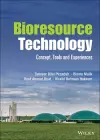
Bioresource Technology
4 authors - Hardback
£172.95
Tanveer Bilal Pirzadah, PhD is Assistant Professor at University Centre for Research and Development (UCRD); Chandigarh University, Punjab, India. After completing his doctorate (Bioresources; specialization in Plant Stress Physiology and Biofuels) from University of Kashmir, Srinagar, India, in 2017, he worked as an Assistant Professor at the Cluster University Srinagar. Dr. Tanveer has about 9 years of research and teaching experience in bioresources management, biofuels, plant stress physiology, biotechnology and molecular biology, medicinal plant research, plant-metal interactions as well as in environmental studies. He also has to his credit more than 30 research publications in peer-reviewed international journals and more than 30 book chapters in edited volumes and 02 edited book with international publishers. At present, Dr. Tanveer serves as an editorial board member and reviewer of several international scientific journals. He is also member of the World Academy of Sciences and Plantae group of the American Society of Plant Biologists. Currently, Dr. Tanveer is engaged in studying the plant processes at proteomic, metabolomic and molecular level to better understand the dynamic plant-metal interactions.
Bisma Malik, PhD is Assistant Professor at University Centre for Research and Development (UCRD); Chandigarh University, Punjab, India. She is the recipient of Women scientist (WOS-A) fellow from DST, Government of India. She is actively engaged in research and has 9 years of research experience in plant stress physiology, molecular biology and environmental studies. She has worked on stress biology and genetic diversity of chicory-an untapped Bioresource from Kashmir Himalaya. She has to her credit 30 publications in international journals and 30 book chapters of International repute. Currently, Dr. Bismais engaged in studying plant endophytes as a promising source of lead compounds that has immense potential in the pharmaceutical sector.
Prof. (Dr.) Khalid Rehman Hakeem, PhD is Professor at King Abdulaziz University, Jeddah, Saudi Arabia. After completing his doctorate (Botany; specialization in Plant Eco-physiology and Molecular Biology) from Jamia Hamdard, New Delhi, India, in 2011, he worked as a lecturer at the University of Kashmir, Srinagar, for a short period. Later, he joined Universiti Putra Malaysia, Selangor, Malaysia, and worked there as Post Doctorate Fellow in 2012 and Fellow Researcher (Associate Prof.) from 2013 to 2016. Dr. Hakeem has more than 10 years of teaching and research experience in plant eco-physiology, biotechnology and molecular biology, medicinal plant research, plant-microbe-soil interactions as well as in environmental studies. He is the recipient of several fellowships at both national and international levels; also, he has served as the visiting scientist at Jinan University, Guangzhou, China. Currently, he is involved with several international research projects with different government organizations.
So far, Dr. Hakeem has authored and edited more than 50 books with international publishers, including Springer Nature, Academic Press (Elsevier), and CRC Press. He also has to his credit more than 115 research publications in peer-reviewed international journals and 60 book chapters in edited volumes with international publishers. At present, Dr. Hakeem serves as an editorial board member and reviewer of several high-impact international scientific journals from Elsevier, Springer Nature, Taylor and Francis, Cambridge, and John Wiley Publishers. He is included in the advisory board of Cambridge Scholars Publishing, UK. He is also a fellow of Plantae group of the American Society of Plant Biologists, member of the World Academy of Sciences, member of the International Society for Development and Sustainability, Japan, and member of Asian Federation of Biotechnology, Korea. Dr. Hakeem has been listed in Marquis Who’s Who in the World, since 2014–2020. Currently, Dr. Hakeem is engaged in studying the plant processes at eco-physiological as well as molecular levels.